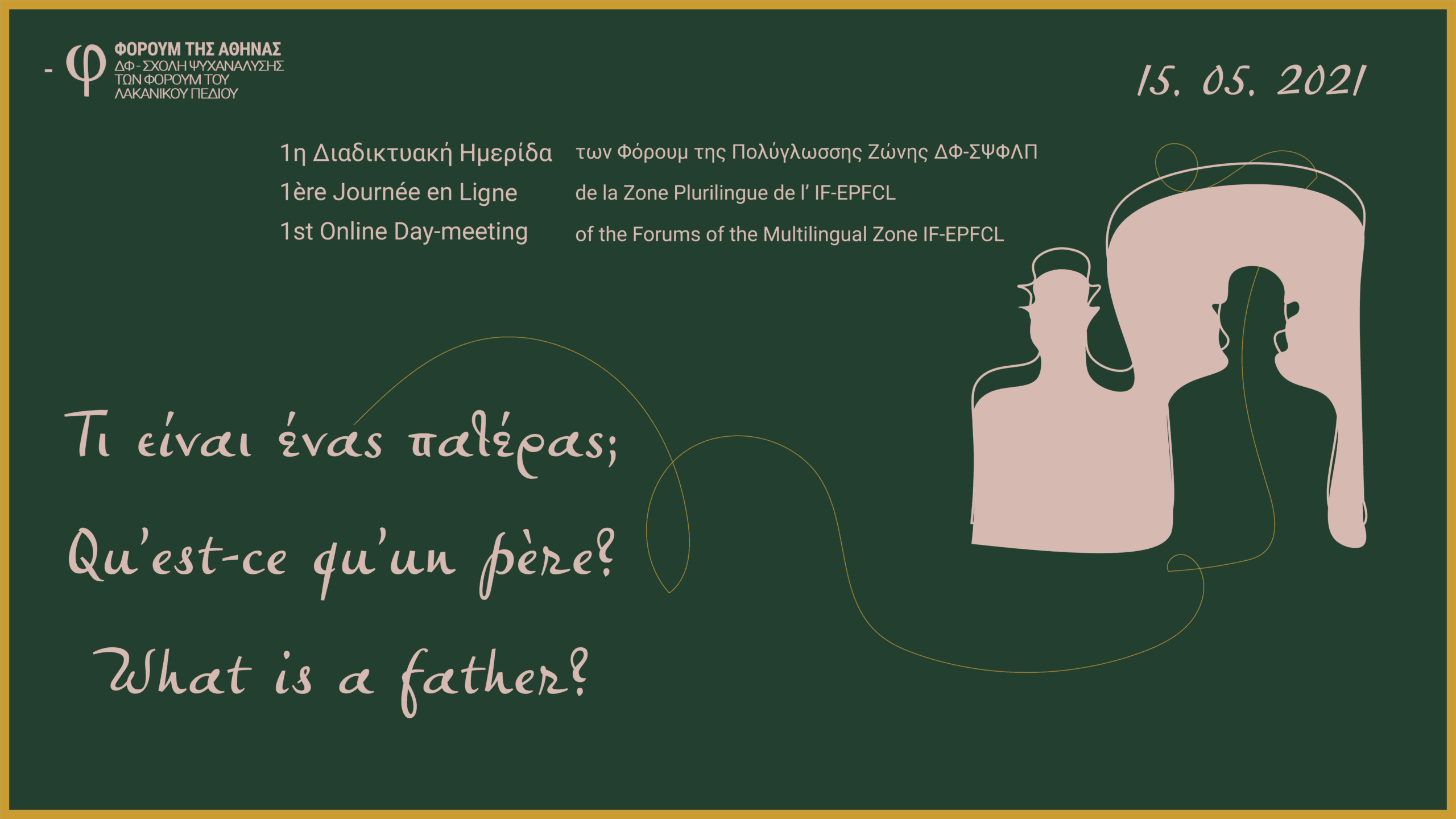
What is a father? – 1st Online International Conference of the Forums of the Multilingual Zone IF-EPFCL
The forum of Athens decided to put this question to work because, in one way or another, it is in the center of the analytical experience because it implies, for each subject, a referential relationship which refers to the particularity of the paternal function.
The father, who has retained a certain place in Freudian constructions, is always linked to the castration complex, which is not a myth of the father but “a bone, as Lacan said, a reality which owes nothing to the whipping father”[1].
In this sense, the oedipal problematic focuses on the way the subject will situate itself in relation to the function of the father, who is presented? at the crossroads of three aspects: symbolic father, imaginary father and real father. From the father of the primitive horde of the Totem and Taboo to the seductive father, and then to the Daddy cool, and the versions of the modern father and his role in the contemporary family, we find the projection of a series of readings related to the knowledge about the father that puts different interpretations of the subject’s psychic life back on the construction site forever. The successive analyses of the place of a father in the paternal function assumed or not by his position, are part of the history of the re-elaboration of the question of the father subject and lead to consequences which may resound to several generations. The plurality of the father’s names and theoretical research concerning his place touches a truth which is not outside the realm of individual action and positions taken in any community.
In renewing the question posed on our first multilingual conference, the question of the desire of its transmission is brought to the fore, because
The relationship of law to desire is so close that only the function of law traces the path of desire. Desire as desire for the mother is identical to the function of the law. It is in so far as the law forbids it that it imposes to desire it, because, after all, the mother is not in itself the most desirable object. If everything is organized around the mother's desire, if it is to be preferred that the woman should be other than the mother, what does it mean - except that a commandment is introduced into the very structure of desire. To put it bluntly, one desires the commandment. The myth of the Oedipus means that the father's desire is what made the law...
Jacques Lacan Le séminaire livre X, L’angoisse, p. 126.
With regard to the father, who in principle is not an equivocal, it can be argued that what is at stake in the analysis of the term is not the analysis of someone as a father but the analytical interpretation in the sense given by Lacan in the text he called L’Etourdit which is entirely built on this foundation. The sentence which serves as an entry, Let it be said, remains forgotten behind what is said in what is heard, both says what it says and serves as the grammatical object for the verification of the very fact that it states, as well: this is precisely the function of interpretation in analysis. It aims at the restitution of the forgotten saying and what follows, because the root of the etiology of neurosis remains the same: a passion for being which leads the subject to ignore his own lack of being as it is depicted in his moral, legal, political, religious, even scientific creations.We shall attempt to grasp how the question is asked at the point where we are and how the organization of our civilization based on the disietude of the patrilineal form of the family -present in the actual discourse of different forms of family which are being created- is taking place at the present time.
[1]Colette Soler, L’inconscient réinventé, p.160
Stylianos Moriatis
SCIENTIFIC COMMISSION
Stylianos Moriatis (Responsible of the conference)
Maria Koukoumaki, FCL Athènes
Katerina Karagianni, Forum d’ Athènes
Begum Topaloglu, FCL de Turquie
Cynthia Jabbour, FCL du Liban
Anna Wojakowska-Skiba, FCL de Pologne
Ioana Ciovarnache, FCL de Roumanie
ORGANISATIONAL COMMISSION
Dionisios Bratis (Responsible o.c.)
Georgios Giakoumakis
Katerina Karagianni
Evangelia Kommata
Anna Christodoulaki
Dora Karadima
Hourly Schedule
- 11:00 - 11:15
- Greetings
- Stylianos Moriatis, Responsible for the day</br>George Giakoumakis, Delegate of the Athens Forum
1st Roundtable - Moderated by: Panos Seretis
- 11:20 - 11:35
- What Is (That) a Father…Wants from a Women?
- Radu Turcanu
- 11:35 - 11:50
- Why not Oedipus?
- Jan Tkaczow
- 11:50 - 12:05
- Position of the father in relation to the mother's desire
- Anna Christodoulaki
- 12:05 - 12:20
- A symptom-version father
- Zehra Eyrouk
- 12:20 - 12:40
- Discussion
Conference - Moderated by: Maria Velissaropoulos
- 12:45 - 13:45
- Collete Soler: “Another malediction”
- 13:45 - 14:00
- Debate
2nd Roundtable - Moderated by: Anna Wojakowska–Skiba
- 15:05 - 15:20
- What is a father?
- Marcin Piotrowski
- 15:20 - 15:35
- "...the father of the name?"
- Diego Mautino
- 15:35 - 16:00
- A Father between Cain and Abel - Which Father?
- Simay Karakaş
- 16:00 - 16:20
- Discussion
3rd Roundtable - Moderated by: Sahar Yacoub
- 16:35 - 16:50
- The Name-of the Father : another name of the subject
- Evangélie Kommata
- 16:50 - 17:05
- A suffering triangulation
- Elie Helou
- 17:05 - 17:20
- Less than a Father
- Özgür Öğütcen
- 17:20 - 17:35
- The father's ab-sense
- Stylianos Moriatis
- 17:35 - 18:00
- Discussion
- 18:00 - 18:30
- Concluding remarks – Announcement of the next conference
- Dionysis Bratis, Responsible of the organising committee</br>Mounir Chalhoub, Representative of the multilingual area

